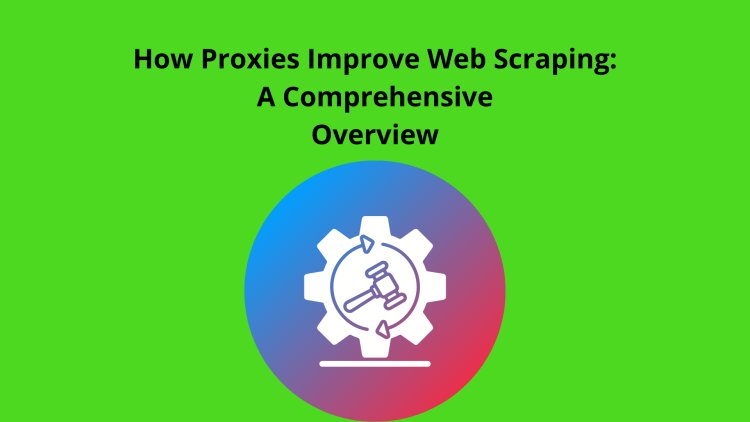How Proxies Improve Web Scraping: A Comprehensive Overview
"A brief summary of the webpage's content goes here.

How Proxies Improve Web Scraping: A Comprehensive Overview
Web scraping is a powerful technique used to extract large amounts of data from websites, whether for market research, competitive analysis, or price tracking. However, scraping at scale can be challenging due to various obstacles like IP blocking, CAPTCHAs, and rate limits. This is where proxies come in. In this article, we’ll explain how proxies enhance the web scraping process and help overcome these challenges.
What Is Web Scraping?
Web scraping involves automating the extraction of data from websites using bots or software programs. This data can include text, images, product information, prices, and more. While scraping is highly valuable for businesses and researchers, it often triggers security measures like IP bans or CAPTCHA requests.
Why Do You Need Proxies for Web Scraping?
Proxies act as intermediaries between your web scraping tool and the target website, masking your real IP address. When you scrape a website without proxies, it’s easy for the site to detect and block your IP, especially if you're making numerous requests in a short time. Proxies help bypass these issues by rotating IP addresses, ensuring your scraping activity remains anonymous and uninterrupted.
How Proxies Improve Web Scraping
-
Bypass IP Blocks and Rate Limits
Websites often monitor the volume of requests coming from a single IP address. If they detect an unusually high number of requests, they may block that IP to prevent scraping. Proxies help by distributing requests across multiple IPs, making it harder for websites to detect scraping activity. -
Avoid CAPTCHA Challenges
When a website detects suspicious activity from a single IP, it often triggers a CAPTCHA challenge to confirm the request is from a human. Using proxies, especially rotating proxies, reduces the chances of hitting CAPTCHAs since different IPs appear as unique users, preventing detection. -
Access Geo-restricted Content
Many websites restrict access to content based on geographic location, showing different results to users in different countries. Proxies allow you to use IP addresses from specific regions, giving you access to geo-restricted data that would otherwise be unavailable. -
Enhanced Anonymity
Proxies help keep your identity safe by masking your real IP address. This prevents websites from tracking and associating scraping activity with your personal or business network. Enhanced anonymity is critical for protecting sensitive business data. -
Manage High-Volume Scraping Tasks
When scraping large datasets, proxies can distribute the workload among multiple IPs, which helps prevent your IP from being blacklisted. Rotating proxies, in particular, can change the IP address periodically, allowing you to scrape more data at a faster rate without triggering security defenses.
Types of Proxies Used in Web Scraping
-
Residential Proxies:
Residential proxies are linked to real residential IP addresses provided by ISPs. They are highly effective in mimicking regular user traffic, making them ideal for web scraping tasks that require a high level of anonymity and minimal risk of detection. -
Datacenter Proxies:
Datacenter proxies are not tied to ISPs but are generated in data centers. These proxies are faster and cheaper than residential proxies but are more easily detectable by websites, especially when scraping large-scale data. They are best used in non-sensitive scraping activities. -
Rotating Proxies:
These proxies automatically rotate IP addresses either with each request or at specified intervals. Rotating proxies are particularly useful for large-scale scraping because they help avoid IP blocks by making each request appear to come from a different user. -
Private Proxies:
Private proxies are dedicated to a single user or business, offering high performance and exclusivity. They are less likely to be blacklisted since they’re not shared with others, making them an excellent choice for high-volume, reliable web scraping.
Best Practices for Using Proxies in Web Scraping
-
Use a Proxy Pool:
To avoid detection and increase reliability, use a large pool of proxies. This ensures that requests are distributed across many IPs, reducing the risk of hitting rate limits and CAPTCHA challenges. -
Rotate Proxies Frequently:
Rotating proxies every few requests or after each session helps to avoid being blocked. Regular rotation also ensures that your scraping activities appear as coming from different users, preventing detection. -
Implement Delay Between Requests:
To avoid overwhelming the target website, introduce a delay between requests. This reduces the chances of triggering security measures like IP bans or CAPTCHAs. -
Combine Proxies with User-Agent Rotation:
Along with proxies, rotate user-agent strings to further disguise your scraping activity. This makes it harder for websites to distinguish automated scraping from human browsing.
Conclusion
Proxies are an essential tool for effective web scraping, helping to bypass IP blocks, prevent CAPTCHA challenges, and access geo-restricted content. Whether using residential, datacenter, or rotating proxies, they allow you to scrape data efficiently and anonymously. By incorporating proxies into your web scraping strategy, you can overcome common obstacles and improve the reliability and scale of your data collection efforts.
What's Your Reaction?


















